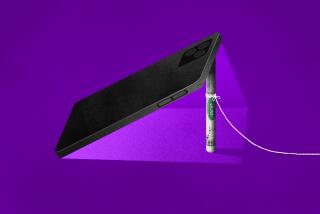Cointel Gets Jump on Newly Opened Pay-Phone Market
When the Federal Communications Commission opened a new industry 19 months ago by giving entrepreneurs the right to operate pay telephones, it was only natural for Allan Glezerman to jump in.
Glezerman got started in what he calls the “coin business” in 1956, fixing candy and soft-drink vending machines in Cleveland. Later, he moved into video games and pinball machines.
Seeing new opportunities in pocket change, Glezerman started diversifying into the pay phone business in July, 1984, when he founded a Calabasas-based distribution firm named Cointel. The company sells pay phones that are installed in convenience stores, gas stations and other public places.
Entrepreneurs Collect
Unlike those installed by traditional telephone companies such as Pacific Bell, Cointel’s pay phones are owned and maintained by entrepreneurs, who collect the nickels, dimes and quarters that people insert to make calls.
Glezerman said his companies have “always been the same business--coins, machines and electronics. And then, all of a sudden, we’re a phone company.”
Cointel is one of hundreds of firms hoping to gain a foothold in the private pay phone market. Although it is the only one selling phones registered with the FCC that accept coins as well as credit cards such as those from American Express, MasterCard and VISA, competitors soon are expected to offer similar equipment.
Bare Dent in Market
Traditional phone companies so far haven’t lost much of the estimated $4 billion a year in revenue from pay phones, though. Only $2 million in calls came from entrepreneur-owned pay phones last year, according to the National Pay Phone Assn., a trade group based in McLean, Va.
Cointel, however, is a leader in its fledgling industry. Its position was bolstered last month when it landed a $7.8-million contract to sell 5,000 phones this year to Coinphone Services, a Miami company that will install the phones in hotels and restaurants in California, Florida, New York and Texas.
That contract alone will exceed publicly held Cointel’s revenue for 1985, estimated by Glezerman to be $6 to $7 million, most of which came from the company’s pinball and video game unit that serves movie theaters. Cointel, which employs 20, lost $800,000 to $1 million for the year, Glezerman said.
Gail G. Sherman, a Cointel vice president, said the company expects to be making money by the end of this year. The profits are to come largely from the spread between what Cointel pays for phones from its supplier, Advanced TeleSystems of Brookings, S. D., and the price it gets by reselling them to customers such as Coinphone Services. Under its contract, Coinphone Services is paying Cointel $1,600 a phone.
Lifeblood Is Technology
The emergence of pay phone companies such as Cointel depends on new technology. Their phones must be “smart,” meaning they need built-in software that computes telephone charges, along with timers and voice synthesizers to perform the same functions as the telephone company’s central office.
The pay phone industry was launched with a June, 1984, ruling by the FCC that permitted interstate calls from entrepreneur-owned pay phones while giving states the option of banning calls made within their borders.
By the end of 1985, however, 35 states approved intrastate calls on private pay phones. California is expected to follow suit by the end of March, according to the state Public Utilities Commission.
A tariff system expected to be approved by the PUC will allow the new pay-phone companies to charge more than old-line phone companies. Pay phone entrepreneurs would be able to charge 25 cents per local call, a nickel more than Pacific Bell charges. On toll calls, private pay phones would be able to charge up to 10 cents more per call.
Part of the extra charge goes to those who agree to have private pay phones on their premises. For example, Bob Alexander, president of Coinphone Services, said he plans to offer 10% commissions--about $25 on a typical $250 coin box--in California, more than double what Pacific Bell offers.
Formidable Investment
Firms such as Coinphone Services receive what is left after commissions, maintenance costs and telephone line fees--which amount to about 50% of the revenue a phone yields--are paid. The initial investment in the phones is high enough that many companies won’t turn a profit for several years, said John Cunningham, president of San Diego-based Megatel, a private pay phone firm.
The industry’s biggest stumbling block is the quality of its phones, said John Huddleston, a marketing manager for Williams Electronics, a New York-based firm that plans to begin producing pay phones next month.
“Everyone and his uncle can go sign up locations promising better commissions,” Huddleston said. “But the whole business depends on being able to get the customers phones that work.”
More to Read
Inside the business of entertainment
The Wide Shot brings you news, analysis and insights on everything from streaming wars to production — and what it all means for the future.
You may occasionally receive promotional content from the Los Angeles Times.










